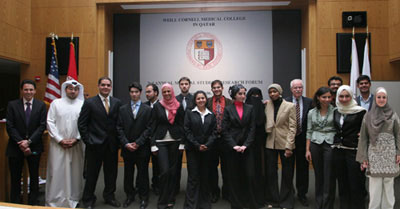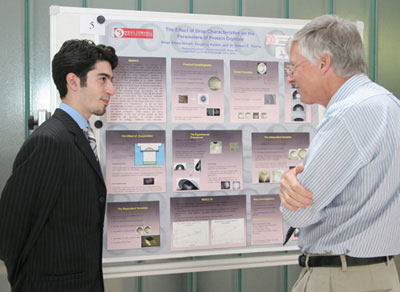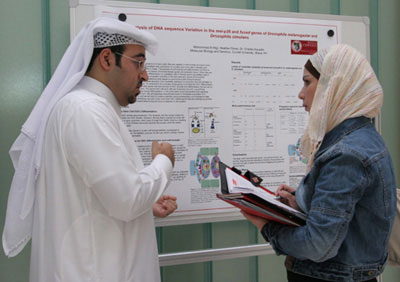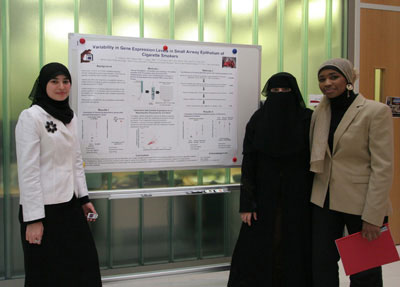Switched on by research

The Annual Medical Student Research Forum is a highlight of the
academic year at WCMC-Q.
A summer working in the research labs of Cornell University in Ithaca and Weill Cornell Medical College in New York and Qatar provided many students with the opportunity to discover their potential as the researchers of tomorrow.
It was an eye-opening experience that focussed the minds of medical students on research as a possible career. Many expressed their newfound appreciation of, and keen interest in, biomedical research following WCMC-Q’s third Annual Medical Student Research Forum on November 6.
A highlight of the academic semester, the Forum featured 18 presentations on research carried out in the summer by students from the Class of 2009 and 2010. Their work took an in-depth look at various health topics, from breast cancer to blood disorders to ventricular fibrillation.
For the first time, this year’s event included two presentations on an extensive and ongoing collaborative investigation by Weill Cornell in New York and in Qatar and Hamad Medical Corporation (HMC), looking at how the interaction between the environment and genes may lead to the development of complex lung disorders. The research is being led by Dr. Ronald Crystal, professor and Chairman of the Department of Genetic Medicine at Weill Cornell in New York.
Students explained their work by way of oral and poster presentations to an audience that included faculty from the Medical College in Qatar and New York, students, HMC representatives, and other invited guests.

First-year medical student Anas Abou Ismail explains to professor of
physics, Dr. Roger Hinrichs, how his desire to pursue a career in
research was strengthened over the summer.
WCMC-Q Senior Associate Dean for Research Dr. Gary Schneider commented on the success of the students’ research experience: “I keep hearing from both the Ithaca and New York City professors how engaged and motivated the students are. Their work ethic is unbelievable, and they produce so much as a result of their level of interest and their motivation from being given such an opportunity.”
First-year medical student Nigel Pereira said the experience gave him an insight into the research process and showed him how knowledge was created – a lesson in line with Cornell tradition.
“Most of our critical thinking skills in the med program have improved because we ask the right questions now. We want to go into depth, we don’t believe things from hearsay,” he said. “Research involves so much reading of literature to find out what has already been studied. The experience has given us a renewed appreciation of literature.
“It also exposed us to another potential option for the future. Medicine is such a vast discipline now, and research allows you to become an expert in one particular field.”
Anas Abou Ismail, another first-year medical student, said he discovered first-hand the dedication required to be a world-class researcher. “We worked from the morning until the late evening, depending on the workload,” he said.
“The research became the center of our thoughts. We’d plan our weekends according to when our crystals would grow or when our flies needed to be fed. Sometimes we’d go to the lab in the middle of the night to check if the flies were okay or to see if the crystals were still growing. We took it really seriously, but we enjoyed it.”

Qatari medical student Mohammed Al Hijji describes his genetics
research to an invited guest at the Forum.
The experience left quite an impression on Anas, who is now planning a career in research.
“It changed my mind about what I want to do after medical school. Now I’m sure I want to go into the educational field and be affiliated with a university so I can pursue research,” he said.
Second-year medical students Sara Hassan, Aalia Al Barwani and Zeinab Ammous said they were also considering careers that balanced the clinical and research fields.
All three students took part in a study of gene expression in the airways of the lungs, part of the extensive investigation in both New York City and in Doha led by Dr. Crystal. The study involved an analysis to see which genes are ‘switched on’ and which are ‘switched off’ in patients with lung diseases, such as emphysema and chronic bronchitis.
Sara and Aalia worked on a proof-of-concept demonstration pilot project based in Doha, with active participation of physicians at HMC; while their colleague, Zeinab, worked on data analysis at Weill Cornell in New York.

Second-year medical students Zeinab Ammous, Sara Hassan and
Aalia Al Barwani (pictured) carried out research that may lead to
new therapies for lung diseases. The study is part of an ongoing
investigation by Weill Cornell in New York and
Qatar and Hamad Medical Corporation.
“Our project involved looking at the effect of smoking on gene expression amongst populations from different ancestries,” Sara said.
“We wanted to find out if smoking itself causes these (lung) diseases or if your genes or DNA have some influence,” Aalia said.
Zeinab said she hoped the research would help find the genes that make people susceptible to the harmful effects of smoking, and the genes that protect against these effects.
Assistant research professor in the Department of Genetic Medicine at Weill Cornell in New York, Dr. Timothy O’Connor, said the students had carried out and presented the first stage of the research project, identifying some candidate genes for diseases.
“The second stage is only just starting. Instead of looking at gene expression levels, we will be looking at polymorphisms in the genome itself,” he said. “What we hope to do is associate polymorphisms in genes with the gene expression levels.
“For example, smoking is associated with lung cancer, however only 20 per cent of people who smoke get the disease. So the environmental effect of the smoking is causing the disease, but it’s obviously interacting with the genetic makeup of the individual.
“The genetic differences between people will be very informative in helping us figure out which genes protect you from getting a disease in the face of this environmental insult, and which make you susceptible to getting the disease.”
Qatar National Research Fund special projects officer, Dr. Imad Khadduri, said he was very impressed by the high quality of research presented at the Forum. “This is exactly what we’re looking for and trying to encourage,” he said. Dr. Khadduri highlighted the Qatar-based research project for its relevance to the region. “I am very enthusiastic about this project,” he said
Chairman of the Research Committee and head of the Medical Research Center at HMC, Dr. Naser Al Ansari, highlighted the value of collaboration between centers like HMC and Weill Cornell Medical College. The transfer of knowledge was about learning by teaming up with international experts, he said.
“The plan is to have more joint projects (between HMC and Weill Cornell) in the future. I think there is a lot of potential if we mix our strengths. This is a good way forward.”
Qatari medical student Mohammed Al-Hijji, who carried out genetics-based research at Cornell University over the summer, said he was keen to become involved in future projects based in Qatar.
“We’re planning to do research in Qatar, and this has given us a view of the atmosphere of research, how we design a project, and how to work as a team,” he said.
Mohammed said he was particularly interested in genetics research because it could lead to discoveries that would prevent, slow down or even cure different diseases.
Report by Krista Dobinson, Assistant Editor/Writer
